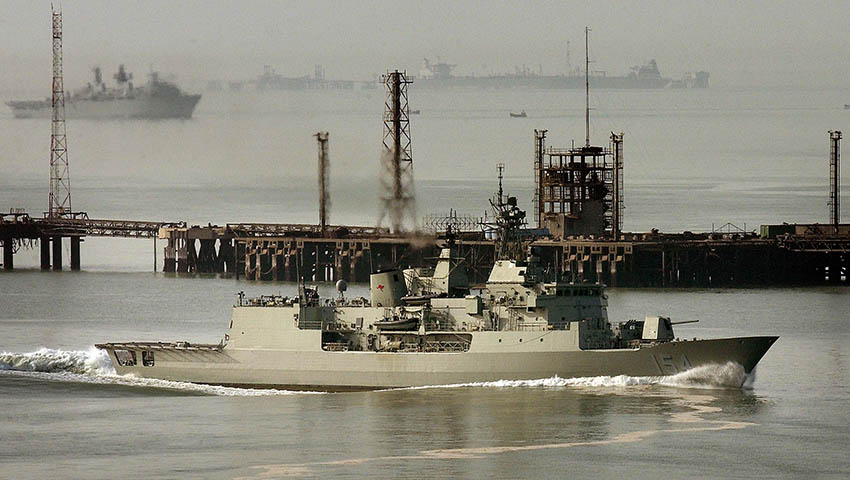Growing concern about Australia’s lack of strategic resource reserves – mainly liquid energy supplies – is emerging as a major issue to be faced by the new government and Australia’s strategic policy leaders as the world becomes increasingly unpredictable.
To continue reading the rest of this article, please log in.
Create free account to get unlimited news articles and more!
Over the next decade, Australia has committed $200 billion to overhauling the capabilities of the Australian Defence Force and the development of the domestic defence industry as part of the nation's largest rearmament since the Second World War. However, the changing nature of modern conflict and the increasingly contested nature of the international commons, particularly in the maritime domain, presents significant challenges to the nation's enduring national economic and strategic security.
Central to this challenge is Australia's dependence on the ocean and strategic sea-lines-of-communication (SLOC) for access to critical energy supplies – namely crude and refined oil products following the closure of Australia's only remaining oil refinery at Kurnell in 2014. As NSW senator and former Australian Army Major General Jim Molan posited, what good is a fleet of advanced land, air and sea assets if we can't fuel, arm, repair and maintain them?
Further exacerbating these challenges is the limited capacity for Australian industry to provide and maintain a limited number of critical spare parts for high-technology platforms like the Lockheed Martin F-35, the Boxer Combat Reconnaissance Vehicles and M1 Abrams, and Navy's Hobart Class and future Hunter Class and Attack Class vessels, as well as the nation's declining ability to manufacture and produce critical strategic resources – including steel, coking coal and aluminium.
While much of the focus has been placed on Australia's concerning lack of liquid energy resources – the issue is a broader tactical and strategic challenge requiring a nuanced and considered response in order to insulate Australia from both regional and global shocks and supply constrictions.
What examples exist internationally for Australia to draw inspiration from? How can Australia's strategic and political leaders address the tactical and strategic challenges in the event of regional or global conflagration?
The US Strategic Petroleum Reserve
Established in 1975 following the 1973-1974 oil embargo, the US Strategic Petroleum Reserve (SPR) is an emergency fuel storage of petroleum resources and is currently the largest emergency supply in the world, with the capacity to hold up to approximately 727 million barrels – with current supplies as of February 2019 of 649.1 million barrels or approximately 35 days of oil.
Dispersed among four individual sites along the Gulf of Mexico – each located in close proximity to a major centre of petrochemical refining and processing facilities – the SPR provides energy security for the US and the US Armed Forces in the event of reduced global or domestic supply and in the event of national emergency.
Additionally, as a member of the International Energy Agency (IEA), the US is required to stock an amount of petroleum equivalent to at least 90 days of US imports – with the SPR containing an equivalent to 141 days of US imports as of 2016. It is critical to recognise that the SPR is primarily a crude petroleum reserve, not a stockpile for refined fuels including diesel, gasoline or kerosene.
Unlike Australia, the US model relies heavily on a local refining capability to provide potable fuel resources. Australia, in stark contrast, relies on refineries in Singapore – strategically located at a major geo-strategic chokepoint at the confluence of the Malacca Strait and the South China Sea through which approximately US$5 trillion worth of trade flows annually.
Accordingly, any Australian program requires a balance between storing both crude and refined petroleum resources for domestic industry and military use. Additionally, Australia also needs to develop a domestic refining capacity rather than relying on foreign refining capabilities.
Iron, coal, steel, food and medical supplies
While Australia enjoys a virtually unrivalled wealth of natural resources, the ability to refine and produce vast quantities of steel, coking coal and now domestic agricultural produce and critical, specialised medical supplies also serve as a glaring gap in the broader national security debate. Accordingly, any national strategic reserve policy requires a holistic approach to incorporate these into the development of any policy response.
Contemporary Australia has been far removed from the harsh realities of conflict, with many generations never enduring the reality of rationing for food, energy, medical supplies or luxury goods, and even fewer within modern Australia understanding the socio-political and economic impact such rationing would have on the now world-leading Australian standard of living.
Accordingly, it is now up to Australia's political and strategic leaders to form an integrated policy agenda as part of a broader National Security Strategy – similar to that advocated for by Senator Molan – to include the development of critical national strategic reserves to support the national economy and defence capability during an increasingly troubled period in global history.
Senator Molan stressed the importance of these developments, telling Defence Connect, "We have managed to get away with not having a national security strategy only because we have lived in a tranquil region since 1945. But our strategic environment is changing quickly, and we need to prepare for a turbulent future. Developing a national security strategy would be a vital first step towards building the capacity we need to face the potential challenges that are coming."
Let us know your thoughts in the comments section below, or get in touch with
Stephen Kuper
Steve has an extensive career across government, defence industry and advocacy, having previously worked for cabinet ministers at both Federal and State levels.

 Login
Login








